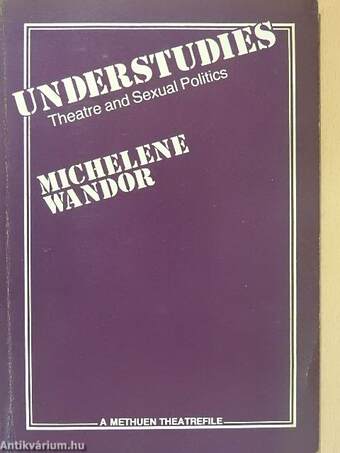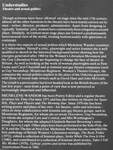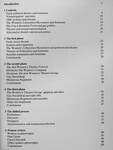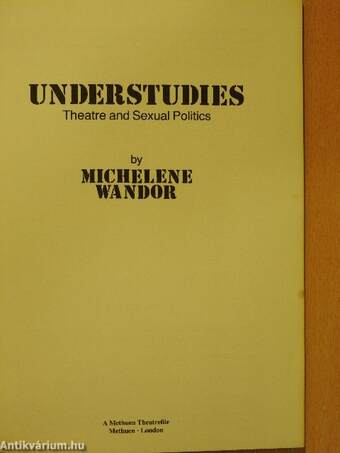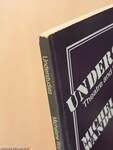1.062.452
kiadvánnyal nyújtjuk Magyarország legnagyobb antikvár könyv-kínálatát

VISSZA
A TETEJÉRE
JAVASLATOKÉszre-
vételek
Understudies
Theatre and Sexual Politics
| Kiadó: | Methuen |
|---|---|
| Kiadás helye: | London |
| Kiadás éve: | |
| Kötés típusa: | Ragasztott papírkötés |
| Oldalszám: | 88 oldal |
| Sorozatcím: | Methuen Theatrefile |
| Kötetszám: | |
| Nyelv: | Angol |
| Méret: | 21 cm x 15 cm |
| ISBN: | 0-413-40060-3 |
naponta értesítjük a beérkező friss
kiadványokról
naponta értesítjük a beérkező friss
kiadványokról
Fülszöveg
Understudies
Theatre and sexual politics
Though actresses have been 'allowed' on stage since the mid-17th century,
almost all the other functions in the theatre have been mainly carried out by
men - writer, director, producer, administrator. Apart from designing (a
typically 'feminine' job), women have consistently been relegated to second
place. Similarly, in content most stage plays put forward a predominantly
heterosexual view of the world, treating homosexuality with ignorance or
contempt.
It is these two aspects of sexual politics which Michelene Wandor examines
in Understudies. Herself a critic, playwright and active feminist she is well
qualified to sketch in the historical background before showing how the
energies generated after 1968 by the Women's Liberation Movement and
the Gay Liberation Front are beginning to change the face of theatre in
Britain. As well as looking at the work of women playwrights such as Pam
Gems and Caryl Churchill and at feminist... Tovább
Fülszöveg
Understudies
Theatre and sexual politics
Though actresses have been 'allowed' on stage since the mid-17th century,
almost all the other functions in the theatre have been mainly carried out by
men - writer, director, producer, administrator. Apart from designing (a
typically 'feminine' job), women have consistently been relegated to second
place. Similarly, in content most stage plays put forward a predominantly
heterosexual view of the world, treating homosexuality with ignorance or
contempt.
It is these two aspects of sexual politics which Michelene Wandor examines
in Understudies. Herself a critic, playwright and active feminist she is well
qualified to sketch in the historical background before showing how the
energies generated after 1968 by the Women's Liberation Movement and
the Gay Liberation Front are beginning to change the face of theatre in
Britain. As well as looking at the work of women playwrights such as Pam
Gems and Caryl Churchill and at feminist and gay theatre companies (such
as Gay Sweatshop, Monstrous Regiment, Women's Theatre Group), she
compares the sexual politics implicit in the plays of the Osborne generation
with those of recent male writers such as David Hare and John McGrath.
The result is a provocative but level-headed look at the British theatre of the
last few years - seen from a point of view that is now perceived as
increasingly important and influential.
MICHELENE WANDOR has been Poetry Editor and a regular theatre
reviewer for Time Out since 1971 and has also written on theatre for Spare
Rib, Plays and Players and The Morning Star. Since 1970 she has been
writing poetry and plays of her own - for theatre, radio and television -
often in close collaboration with feminist and gay theatre groups, such as
Monstrous Regiment, for whom she co-wrote Floorshow, Gay Sweatshop,
for whom she scripted Care and Control, and Mrs Worthington's
Daughters, for whom she adapted Elizabeth Barrett Browning's verse-
noveMurora Leigh. Other plays have been performed at the Soho Poly, the
ICA and the Theatre at New End. Michelene Wandor has also compiled the
first anthology of British Women's Liberation writings, The Body Politic
(1972), edited a collection of feminist plays, Strike While The Iron Is Hot
(1980), and contributed to a collection of feminist short stories, Tales I Tell
My Mother (1978). Upbeat: poems and stories was published by
Journeyman Press in 1982. Vissza
Témakörök
- Szociológia > Társadalmi csoportok > Nők
- Idegennyelv > Idegennyelvű könyvek > Angol > Művészetek > Színház
- Idegennyelv > Idegennyelvű könyvek > Angol > Szociológia > Társadalmi csoportok > Nők
- Idegennyelv > Idegennyelvű könyvek > Angol > Szex, szerelem
- Szociológia > Szociálpolitika > Egyéb
- Szociológia > Társadalmi csoportok > Kisebbségek > Egyéb
- Művészetek > Színház > Színháztörténet > Külföldi
- Művészetek > Színház > Színház és társadalom
- Művészetek > Színház > Idegen nyelv > Angol
- Művészetek > Színház > Tanulmányok, esszék
- Szociológia > Tanulmányok, esszék
- Idegennyelv > Idegennyelvű könyvek > Angol > Szociológia > Tanulmányok, esszék
- Idegennyelv > Idegennyelvű könyvek > Angol > Szociológia > Szociálpolitika > Egyéb
- Idegennyelv > Idegennyelvű könyvek > Angol > Szociológia > Társadalmi csoportok > Kisebbségek > Egyéb
- Szex, szerelem > Kultúrtörténet > Nyugati kultúrkör
- Szex, szerelem > Idegennyelvű



